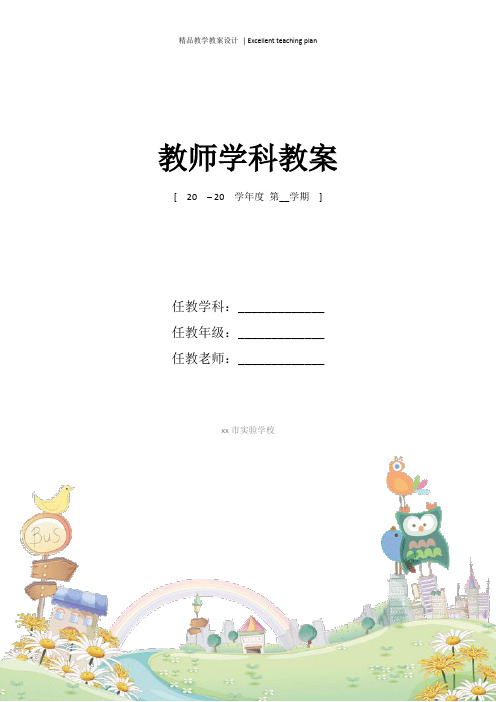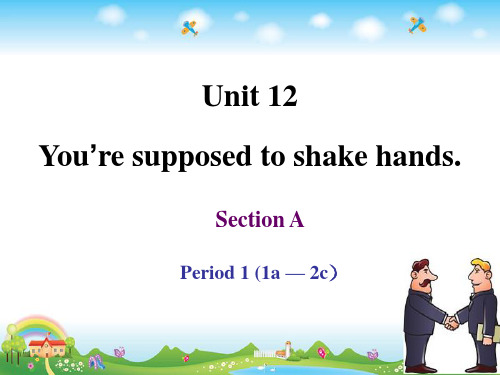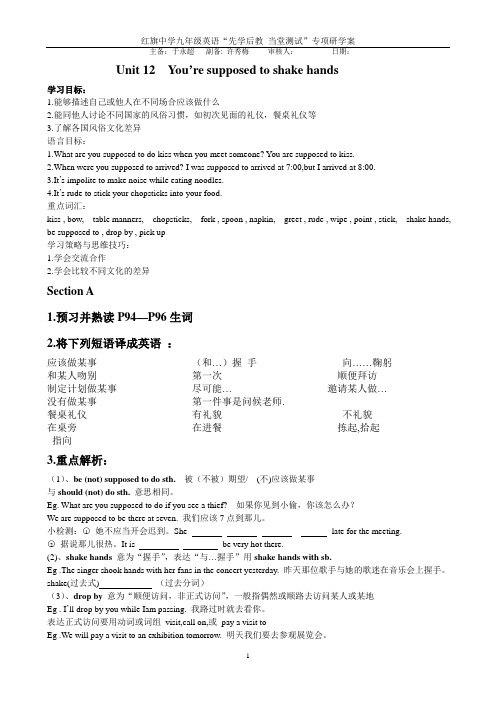Unit12You`re supposed to shake hands SectionB(3a-4)笔记 第六课时
UNIT 12 YOU ARE SUPPOSED TO SHAKE HANDS

二 .[重点词组](key phrases)1. shake hands2. be supposed to do3. make some mistakes4.make plan to do5. on time6. after all7. get angry 8.tabble manners11. make noise 12 point out13. it’s rude to do… 14. have a great time15.get used to … 16.make appointments17.make a toast三 .[交际用语]4. you are not supposed to shake hands.四. [重点难点释义](language points) 1a-41.you are supposed to shake hands.如果你要离开教室,应该先问问老师.不准我们在星期日踢足球.这是秘密,我不应该谈论她又迟到了,她应该向老师说对不起.动词,鞠躬,弯腰.如:向女王鞠躬致敬.终场时,全体演员都走到台前鞠躬致谢.他鞠躬致谢.2ahe greeted her by saying “good morning”他象她打招呼说“早上好”.她向我微笑致意.美丽的景色呈现在我们面前.3a我来的那个地方对时间非常放松.就留在你原来的地方.无论你走到哪里,你都能见到新建的工厂,商店,学校和医院. 毕竟我们是手表王国.(1)句中的land 是一个名词, “国家”“国土”的意思.如: 在外国居住了多年之后,这个人回到了自己的祖国.land 还可以表示“陆地”“土壤”“土地”等意思.如我们在陆路旅行,一直到大海.(2)句子中的词组“after all’’意思是“毕竟”.如:你看,毕竟还是我对吧.你毕竟还是决定来了.在中国,你不应该端起你的饭碗.一个小女孩在回家的路上捡到了一个钱包.我一拿起听筒,电话就不响了.捡起地板上的东西.在巴西,每次喝完东西后你应该用餐巾纸擦嘴.抹去鞋上的污泥.请抹掉洒出来的牛奶.把筷子插入你的食物中.将叉插进肉里看熟了没有.我动不了啦,有一根金属丝刺进我的腿里了.我们中国人通常用筷子吃饭,而英国人不.用你的筷子指着别人是很不礼貌的.(1)rude 形容词,粗鲁的;无理的.常用词组be rude to sb, 意思是“对某人无理”如:打断人家的话是不礼貌的.他们来不了,也不打电话通知一声,太不象话了.(2)point 是一个动词,意思是“指, 指向”.它构成的词组”“point at”意思是“指向”“对准”.如:“我想要这个.”她指着一块大的巧克力蛋糕说.3a1.table manners餐桌礼仪.manner 是“礼貌”的意思,常以复数形式出现.如:嘴里吃着东西说话是不礼貌的.manner 还可以表示“风俗;习惯”时,也常以复数形式出现.如.manner 还可以表示“方法;方式”“态度;举止”等意思.如:don’t you think that david has got a very arrogant manner?你难道不觉得戴维的态度很傲慢吗?你为什么用这种奇怪的方式谈话.我最大的挑战是学会餐桌上的礼仪.behave 动词,意思是“行为举止; 举止”如:孩子昨天晚上表现挺好.老师鼓励孩子们表现得好一些,不要给集体丢脸.在持枪歹徒面前,这个小男孩表现得极有勇气.它还可以表示“守规矩;举止适当有礼”的意思.如:please behave yourself. 请礼貌点儿.你们这些孩子们能不能守规矩点.它的相应的名词是behavior,意思是“行为”.如:我发现学习法语很有用.我想明天有可能结束这项工作.我开始习惯寒冷的天气.她习惯开一辆小车.他将习惯于早起.五.语法知识现在完成时的用法have(has)+过去分词1.现在完成时用来表示现在之前已发生活或完成的动作或状态,但其结果却和现在有联系,也就是说,动作或状态发生在过去但它的影响现在还存在。
《You are supposed to shake hands》 PPT教学课件(第3课时)

…
You’re supposed to greet the host family. You’re supposed to shake hands with people. You’re supposed to say “nihao” to people. You’re not supposed to bow, kiss or hug with people. …
Table manners House rules
It’s polite/impolite to ...
You’re supposed/not supposed to ...
Going out with people You should ...
Chinese customs
It’s polite to ask older people to start eating first at the table.
mad knocking
3. It is __w_o_r_t_h__spending the time to learn about the customs of a country before you go there. That way, you will know what you are supposed to do in different situations.
In my culture, when you are having a meal in someone’s home you’re supposed to allow the elderly to start eating first. you’re not supposed to stick your chopsticks into a bowl of rice. you’re expected to keep your mouth closed when you are
九年级英语下教案新部编本人教版Unit_12_You’_re_supposed_to_shake_hands_重难点解析(1)

教师学科教案[ 20 – 20 学年度第__学期]任教学科:_____________任教年级:_____________任教老师:_____________xx市实验学校Unit 12 You’ re supposed to shake hands 重难点解析(1)[教材全析]友情提示SECTION ALanguage Goal:Tell what you are supposed to do.语言目标:讲一下你应该干什么。
例题探究:He is supposed ________ (ask) what to do.解析:be supposed to do sth.答案:to ask1a What do people do when they meet for the first time?Match the countries and the customs.当人们第一次见面时,他们干什么?将国家和其风俗习惯对应起来。
In your country,what are you supposed to do when you meet someone for the first time?在你们国家,你第一次遇见一个人应该干什么?You’re supposed to shake hands.你应该握手。
1c Talk about what people in different countries do when they meet for the first time.Tell about the countries listed above or other countries you know about.谈论在不同的国家里当人们第一次见面时他们干什么。
谈一谈上面列举的或者你知道的国家。
A:What are people in Korea supposed to do when they meet for the first time?在朝鲜,人们第一次见面应该干什么?B:They’re supposed to bow.应该鞠躬。
Unit 12You’re supposed to shake hands

Dan: I guess you should have asked what you were supposed to ___w_e_a_r__.
Role play the conversation between Maria and Dan. Use the information from 2a and 2b.
In the United States what do the people do when they meet for the first time?
A:What are people in China
supposed to do when they meet
for the first time?
Listen and check your answers in Activity 1a.
Countries 1._c___Brazil 2._b___the United States 3._a___Japan 4._b___Mexico 5._a___Korea
Customs a. bow b. shake hands c. kiss
Listen again. Fill in the blanks.
Maria: I was supposed to _a_r_ri_v_e_a_t__7_: _0_0, but I arrived at 8:00.
Maria: In my country, it’s different. When you’re invited for 7:00, you’re supposed to _c_o_m_e__la_t_e_r.
Unit 12 You’re supposed to shake hands!

Language points:
• be supposed to do
被期望或要求做…; 应该做… •be not supposed to do
不被许可做…
• be supposed to do
•be not supposed to do
c. Japan d. Mexico e. Korea a. The United States b. Brazil
a. in North America, next to Canada b. in South America, next to Peru c. in East Asia, to the east of China d. in North America, on the south of America e. in east Asia. It’s our neighbor.
What are people in ※supposed to do when they meet for the first time?
What are people in ※supposed to do when they meet for the first time?
What are people in ※supposed to do when they meet for the first time?
What are people in ※supposed to do when they meet for the first time?
hug
2a Maria is an exchange student. Last night she had dinner at an American friend’s house. Listen and check (√) the mistakes Maria made.
Unit 12 You’re supposed to shake hands

Unit 12 You’re supposed to shake hands学习目标:1.能够描述自己或他人在不同场合应该做什么2.能同他人讨论不同国家的风俗习惯,如初次见面的礼仪,餐桌礼仪等3.了解各国风俗文化差异语言目标:1.What are you supposed to do kiss when you meet someone? You are supposed to kiss.2.When were you supposed to arrived? I was supposed to arrived at 7:00,but I arrived at 8:00.3.It’s impolite to make noise while eating noodles.4.It’s rude to stick your chopsticks into your food.重点词汇:kiss , bow, table manners, chopsticks, fork , spoon , napkin, greet , rude , wipe , point , stick, shake hands, be supposed to , drop by , pick up学习策略与思维技巧:1.学会交流合作2.学会比较不同文化的差异Section A1.预习并熟读P94—P96生词2.将下列短语译成英语:应该做某事(和…)握手向……鞠躬和某人吻别第一次顺便拜访制定计划做某事尽可能…邀请某人做…没有做某事第一件事是问候老师.餐桌礼仪有礼貌不礼貌在桌旁在进餐拣起,拾起指向3.重点解析:(1)、be (not) supposed to do sth. 被(不被)期望/ (不)应该做某事与should (not) do sth.意思相同。
Eg. What are you supposed to do if you see a thief? 如果你见到小偷,你该怎么办?We are supposed to be there at seven. 我们应该7点到那儿。
Unit 12 You're supposed to shake hands教学演示课件
九年级英语全册
知识导入
What will you do when you meet someone for the first time?
知识介绍 1
What are you supposed to do when you meet someone for the first time? You’re supposed to shake hands. You’re not supposed to kiss.
灵活运用 2
·Listening
Listen and match these sentence parts.
d 1. You aren’t supposed
to … a 2. it’s polite… b 3. It’s rude… c 4. You shouldn’t…
a. to make noise while eating noodles. b. To stick your chopsticks into your food. c. Point at anyone with your chopsticks. d. Eat or drink while walking down the street.
灵活运用 1
·Listening
( 引 用 素 材 见 课 程 目 录 )
2
1
4
3
Tomorrow Steve is going to Japan to be an exchange students. His Japanese friend Satoshi is telling him about the table manners in Japan. Listen and number the pictures in the order Satoshi talks about them.
Unit12 You’re supposed to shake hands[整理]新课程
Now you are a Chinese guide, a group of visitors from the USA are coming. Make a list of things people are supposed to do in different situations!
1.Fill in the blanks in self-check 1.
1. Find more information about e-mail English. 2. Write a note to some friends using e-mail English.
is a new kind of written English that is being used to save time.
meaning
abbreviations homophone punctuation marks Can you write an example of each on your own ?
7.When you leave, it is a custom for you to say: “Goodbye. It was so nice of you to have me.” or “Thank you. I’ve had a nice time.” Then, maybe you can send a thank -you note.
•
• arrived late • greeted Paul’s mother the wrong way • wore the wrong clothes
Fill in the chart according to 2a & 2b:
Maria’s mistakes Maria was supposed to … arrived late
- 1、下载文档前请自行甄别文档内容的完整性,平台不提供额外的编辑、内容补充、找答案等附加服务。
- 2、"仅部分预览"的文档,不可在线预览部分如存在完整性等问题,可反馈申请退款(可完整预览的文档不适用该条件!)。
- 3、如文档侵犯您的权益,请联系客服反馈,我们会尽快为您处理(人工客服工作时间:9:00-18:30)。
Unit12 You`re supposed to shake hands.Section B(3a-4)笔记Dear Laura,Thanks for your message. Yes, I ’m having a great time on my exchange program in France. It ’s even better than I thought it would be. I was a bit nervous before I arrived here, but there was no reason to be. My host family is really nice. They go out of their way to make me feel at home.And you wouldn ’t believe how quickly my French has improved! I ’m very comfortable speaking French now. Although I still make lots of mistakes, it doesn ’t bother me It ’s not necessary to be nervousI can speak French well now.when I study in France as an exchange student 他们费尽心思让我感觉不到拘束。
troubleMy biggest challenge is learning how to behave at the dinner table. As you can imagine, things arereally different from the way they are at home. Forexample, you ’re not supposed to put your bread on your plate. You are supposed to put it on the table !I thought that was pretty strange at first, but now I ’m used to it. You ’re not supposed to eatanything with your hands except bread, not even fruit!(You have to cut it up and eat it with a fork.)Another thing is that it is very rude to say you ’re full. If you don ’t want any more food, you should just say, “It was delicious.”things I am in the habit of itAlso, it ’s rude to put your hands in your lap. You should always keep your hands, but not yourelbows, on the table. I have to say, I find it difficultto remember everything, but I ’m gradually gettingused to things, and do n ’t find them so strangeany more . I ’ll write soon and tell you more about life in France. Hope you ’re having a good school year.Wang Kunlittle by littleI find they are no longer strange.Read the e-mail and make a list of table manners in France!You aren’t supposed to …You are supposed to…put your bread on your plate. eat anything with your hands except bread.say you are full.put your hands in your lap.put it on the table.cut fruit up and eat it with a fork.say “It was delicious.”keep your hands on the table.French table manners 1.You are supposed to put the bread on the plate.2.You should eat everything with a fork.3.It ’s OK to eat fruit with your hands.4.It ’s polite to say “I ’m full ”when you don ’t want to eat any more.5.You shouldn ’t put your elbows on the table.FF FFTtable rude “It was delicious ”except breadhave a great time ( even better---)(a bit nervous)host familyFrenchnice / go out of---/ make---feel at homeimprove quickly / comfortable speaking / although---/ not botherWang Kun’s life in France笔记:1.Thank you for + n./ doing sth.thanks to...幸亏,由于(介词)2.have a great time =have fun =enjoy oneself(good nicewonderful...)3.even, much,a lot ,a little a bit,far,still 修饰形容词的比较级。
(比较级的标志than)4.go out of one's way to do sth.特地做某事/不怕麻烦做某事5.make sb. feel at home 使某人感到宾至如归①make sb./sth.+adj.(做宾补)②make sb.do sth.使某人做某事be made to do sth.③make mistakes make a decision make one's bed make a noise 6.be comfortable doing sth.干某事流畅/流利eg:I'm very comfortable speaking French now.be/feel +adj +doing做某事感到......eg:I feel nervous talking in front of many people.7.①be/get used to +名词或动名词(doing sth.)习惯于... 或习惯于做某事be used to do sth.被用来做某事②used to do sth.过去常常做某事③be used for+名词或doing sth.8.bother 烦扰,打扰。
eg:Hot weather bothers me.9.be different from 与...不同the same as...与...相同10.except 除...之外(不包括在内)besides 除...之外(包括在内)11.full 满的,饱的be full of...充满...be filled with...用...装满12.find it+ adj.+ to do sth.(形式宾语) (不定式做真正宾语)eg:We found it useful to read English in the morningExplanations:They go out of their way to make me feel at home.他们费尽心思使我感觉自在。
go out of one’s way to do sth.意为“不怕麻烦地/ 费尽心思做某事”。
e.g.The driver went out of his way to offer me a lift.那位司机费尽心思地让我搭乘他的车。
Although I still make lots of mistakes, it doesn’t bother me like it used to.虽然我还是出很多错,但它不像以前那样让我烦恼了。
(1)although 为连词,引导让步状语从句,意思是“虽然……但是……”。
though与although同义,但although 较正式,多用于句首。
它们不能和but 连用,但可以和yet, still, nevertheless 等副词连用。
e.g.Although / Though he is very old, yet he is quite strong. 他虽然年纪大了,身体却还很健壮。
(2)副词still意为“还;仍旧”,常位于系动词、助动词或情态动词之后,行为动词之前。
e.g.It was still raining. 雨还在下。
My finger still hurts. 我的手指还痛。
I find it difficult to remember everything, but I’m gradually getting used to things, and don’t find them so strange any more.我发现将一切都记住很难,但慢慢就对这些东西习惯了,也就不再觉得它们很怪异了。
it在此作形式宾语,动词不定式短语to remember everything是真正的宾语,形容词difficult是宾补。
it作形式宾语的基本句型为“主语+ 谓语+ it + 形容词/ 名词+ 动词不定式/ V-ing形式/ that从句”。
e.g.I feel it my duty to help you.我觉得帮助你是我的职责。
